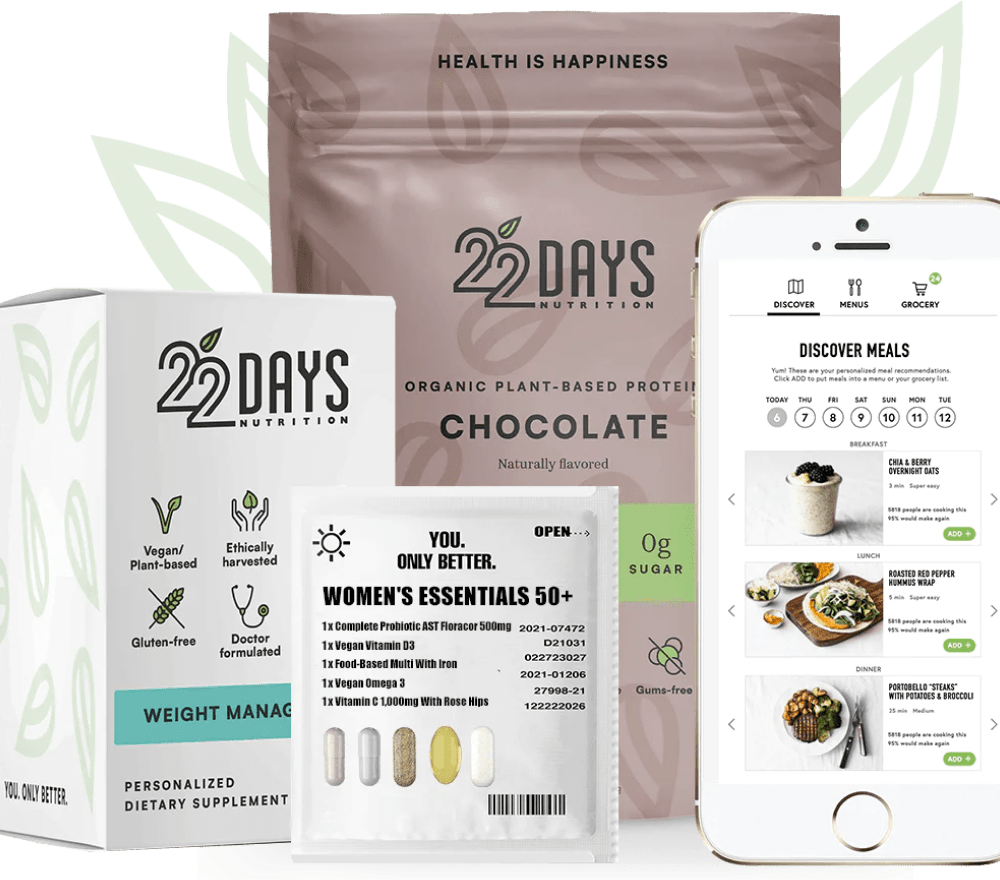3 Simple Tips to Lose the 'COVID 19' Weight Gain, Healthfully

Humans were cooped up inside their homes for over a year. Given this unprecedented circumstance, it’s natural that people put on some weight. Sure, home exercise programs flourished, and it was possible to pick up produce during infrequent trips to the grocery store, but it’s okay to cut yourself some slack, too. The important thing is that we allow ourselves that short reprieve of comfort foods and couch-cuddling, but we eventually lean back into health. Making small but effective changes and leaning into clean, plant-based solutions can help you get back to pre-pandemic shape and leave you healthier than ever before.
What we have to lose
According to a February 2021 survey by the American Psychological Association, 42 percent of American adults reported weight gain during the COVID-19 pandemic. While comically referred to as the ‘COVID 19’ in reference to pounds, the average weight gain was actually closer to 29 pounds.
Beyond the health implications this kind of weight gain inflicts on the body (joint pressure, potential plaque buildup, elevated heart disease risk, and more), we watched as high-risk and overweight individuals struggled with COVID-19 more so than “healthy weight” individuals. The CDC reported that “obesity may triple the risk of hospitalization due to a COVID-19 infection.” The government organization also stated that “People who are overweight may also be at risk.”
The stakes of weight gain are higher in the world we live in right now, but there’s no need to jump on a fad diet or restrict yourself to get back to a low-risk weight. You just have to embrace plants and start moving again.
Tip 1: Eat whole
Unless you’re subsisting off nut butter (which, okay, may have happened a time or two during 2020), it’s difficult to overeat when you stick to whole foods. This is due to the fact that whole foods tend to be nutritionally dense, calorically poor, and full of satiating fiber. Think of foods such as fruits and vegetables, beans and legumes, nuts and seeds, and grains. These foods fill you up, provide plenty of nutrients, and don’t pack on calories (again, with the exception of nuts, seeds, and avocado). Have you ever tried to eat two cups of steamed kale? It feels like a lot, but it’s only 80 calories. In comparison, two cups of kale chips will set you back approximately 300 calories.
It’s not necessary to exclusively eat whole foods to maintain a healthy weight—just try to choose whole when possible. Swapping out your snacks is a great place to start. That being said, life is getting hectic once again, and sometimes we need a quick fix to keep us going—that’s totally okay. In fact, it’s why we created our clean, plant-based protein powders. Packed with 20 grams of plant-based protein per serving, our powders may keep you reaching from something else that could derail your progress. In flavors such as Chocolate, Vanilla, Strawberry, and Peanut Butter, you won’t be tempted to reach for that banana bread your neighbor brought over.
Tip 2: Try plant-based
To lose weight, you don’t have to drop the foods you love—you just need to find a plant-based alternative. Plant-based foods—particularly whole or minimally processed foods—tend to be lower in calories and higher in nutrients and antioxidants compared to their animal-based counterparts. For example, unsweetened almond or cashew milk clocks in between 25-40 calories whereas two-percent cow’s milk will set you back around 120-130 calories (plus unwanted saturated and trans fats).
Again, sticking to whole foods is key (plant-based ice cream is still ice cream, afterall), but incorporating more plants into your diet and swapping out plant-based products for animal-based ones can set you up for success. Remember, it’s not just about weight loss and maintenance, it’s about feeling good. A whole, plant-based diet is 64-times more antioxidant-rich compared to a diet that includes animal foods. Antioxidants fight free radicals and help reduce inflammation—the precursor to disease. Animal-based foods tend to increase inflammation.
Here’s an action item: start small and slowly incorporate more plant-based foods into your diet. Identify one food—like your whey-based protein powder—and switch it with a plant-based option, like our 22 Days Nutrition protein powder. Make these doable changes over time, and see how you feel in 22 days!
Tip 3: Move in a whole new way
When pursuing weight loss, nutrition is key. Unless you’re an ultra-runner, you can’t outrun your mouth. However, movement can complement your nutrition by expediting weight loss. Exercise can also serve as an outlet for that newfound energy powered by plants! But here’s the secret: you don’t have to pick up where you left off pre-pandemic. If going to the gym or going for a run felt like a chore, don’t return to that imposing routine—do something you actually want to do. Find a streaming kickboxing channel like Boxing and Bubbles or Title Boxing, explore the local hiking trails around you, or finally use your apartment community’s pool to swim some laps. Pick something that excites you, and don’t feel guilty for not doing the thing you used to do. Start your exercise routine fresh, and you may just stick with it.
At the end of the day, health is simple. When you’re eating plant-based and moving your body in a way that feels good, that pandemic weight should slide off naturally over time. It’s not a fad diet, and you won’t drop ten pounds in seven days, but it’s a lifestyle that will serve you for years to come.
Fuel well, move happy, and embrace the world as it opens back up to you.
To stock up on clean, plant-based protein, visit our Shop page.





